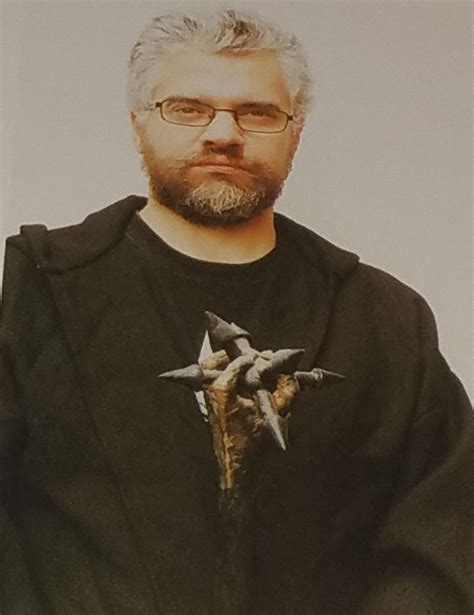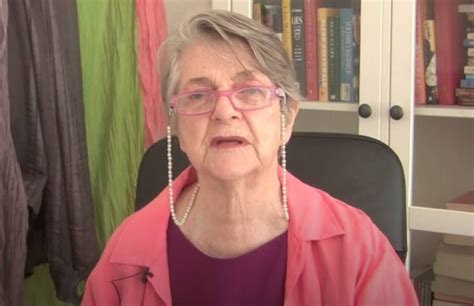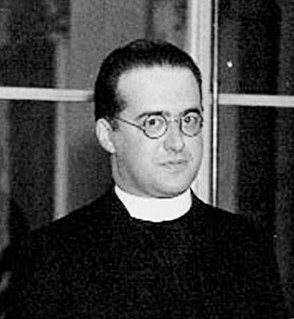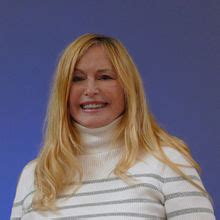Top 561 Quantum Quotes & Sayings - Page 10
Explore popular Quantum quotes.
Last updated on April 16, 2025.
Sometimes the public says, 'What's in it for Numero Uno? Am I going to get better television reception? Am I going to get better Internet reception?' Well, in some sense, yeah. ... All the wonders of quantum physics were learned basically from looking at atom-smasher technology. ... But let me let you in on a secret: We physicists are not driven to do this because of better color television. ... That's a spin-off. We do this because we want to understand our role and our place in the universe.
Henceforth, whilst there are a great many theories and models proposed as to how, or why, magic works (based on subtle energies, animal magnetism, psychological concepts, quantum theory, mathematics or the so-called anthropomorphic principle) it is not a case that one of them is more 'true' than others, but a case of which theory or model you choose to believe in, or which theory you find most attractive. Indeed, from a Chaos Magic perspective, you can selectively believe that a particular theory or model of magical action is true only for the duration of a particular ritual or phase of work.
A successful unification of quantum theory and relativity would necessarily be a theory of the universe as a whole. It would tell us, as Aristotle and Newton did before, what space and time are, what the cosmos is, what things are made of, and what kind of laws those things obey. Such a theory will bring about a radical shift - a revolution - in our understanding of what nature is. It must also have wide repercussions, and will likely bring about, or contribute to, a shift in our understanding of ourselves and our relationship to the rest of the universe.
Doing is a quantum leap from imagining. Thinking about swimming isn't much like actually getting in the water. Actually getting in the water can take your breath away. The defense force inside of us wants us to be cautious, to stay away from anything as intense as a new kind of action. Its job is to protect us, and it categorically avoids anything resembling danger. But it's often wrong. Anything worth doing is worth doing too soon.
We look at the human body as a biochemical machine controlled by genes and therefore we see a mechanical aspect to life and then try to understand the nature of mechanics by looking at how the physical parts interact with each other. If you want to understand life you just look at it as a whole series of interactive chemical reactions. What we are leaving out is the invisible elements, the contributions of the invisible world, which are emphasized in the nature of quantum mechanics. Matter is energy and is a primary factor that must be considered because everything is ultimately energy.
Should a priest reject relativity because it contains no authoritative exposition on the doctrine of the Trinity? Once you realize that the Bible does not purport to be a textbook of science, the old controversy between religion and science vanishes . . . The doctrine of the Trinity is much more abstruse than anything in relativity or quantum mechanics; but, being necessary for salvation, the doctrine is stated in the Bible. If the theory of relativity had also been necessary for salvation, it would have been revealed to Saint Paul or to Moses.
This act is as horrible as killing a cancer cell. It must be done for the sake of the future of the whole. So be it: be prepared for the selection process which is now beginning. We, the elders, have been patiently waiting until the very last moment before the quantum transformation, to take action to cut out this corrupted and corrupting element in the body of humanity. It is like watching a cancer grow; something must be done before the whole body is destroyed... The destructive one fourth must be eliminated from the social body.
I have an abiding interest in how ordinary people produce knowledge, and what it means for individuals to know the world. I thought I'd be a theoretical physicist because I love physicists' views of the world - I find general relativity and quantum theory thrilling - but I have always felt uneasy with the idea of an Ultimate Truth. One of the functions of science is to help us instrumentally; it helps us to build things like microchips and GPS satellites. But another function of science in the modern world is to help us feel "at home in the universe".
Isn't it true that whatever isn't determined by our genes must be determined by our environment? What else is there? There's Nature and there's Nurture. Is there also some X, some further contributor to what we are? There's Chance. Luck. This extra ingredient is important but doesn't have to come from the quantum bowels of our atoms or from some distant star. It is all around us in the causeless coin-flipping of our noisy world, automatically filling in the gaps of specification left unfixed by our genes, and unfixed by salient causes in our environment.
Atoms are weird stuff, behaving like active agents rather than inert substances. They make unpredictable choices between alternative possibilities according to the laws of quantum mechanics. It appears that mind, as manifested by the capacity to make choices, is to some extent inherent in every atom. The universe is also weird, with its laws of nature that make it hospitable to the growth of mind. I do not make any clear distinction between mind and God. God is what mind becomes when it passes beyond the scale of our comprehension.
Through experiments over the past few decades physicists have discovered matter to be completely mutable into other particles or energy and vice-versa and on a subatomic level, matter does not exist with certainty in definite places, but rather shows 'tendencies' to exist. Quantum physics is beginning to realise that the Universe appears to be a dynamic web of interconnected and inseparable energy patterns. If the universe is indeed composed of such a web, there is logically no such thing as a part. This implies we are not separated parts of a whole but rather we are the Whole.
It has been said that the three great develpments in twentieth century science are relativity, quantum mechanics, and chaos. That strikes me the same as saying that the three great developments in twentith century engineering are the airplane, the computer, and the pop-top aluminum can. Chaos and fractals are not even twentieth century ideas: chaos was first observed by Poincare and fractals were familiar to Cantor a century ago, although neither man had the computer at his disposal to show the rest of the world the beauty he was seeing.
Quantum theory thus reveals a basic oneness of the universe. It shows that we cannot decompose the world into independently existing smallest units. As we penetrate into matter, nature does not show us any isolated "building blocks," but rather appears as a complicated web of relations between the various parts of the whole. These relations always include the observer in an essential way. The human observer constitute the final link in the chain of observational processes, and the properties of any atomic object can be understood only in terms of the object's interaction with the observer.
I have tried to read philosophers of all ages and have found many illuminating ideas but no steady progress toward deeper knowledge and understanding. Science, however, gives me the feeling of steady progress: I am convinced that theoretical physics is actual philosophy. It has revolutionized fundamental concepts, e.g., about space and time (relativity), about causality (quantum theory), and about substance and matter (atomistics), and it has taught us new methods of thinking (complementarity) which are applicable far beyond physics.
Over time, I started becoming more aware of the vastness and complexity of the universe, which led me away from any sort of conventional Christianity. I still love the teachings of Christ, but I also believe that the human condition prevents us from having any true objective knowledge of the universe. All human belief systems are inherently flawed. If I had to label myself now, I'd call myself a Taoist-Christian-agnostic quantum mechanic. Also, there's nothing in the actual Bible that limits a Christian in their interest in science. Anti-science is a function of ignorant fundamentalism.
The playfulness that I talk about comes very slowly. You cannot just jump out of your seriousness which you have accumulated for lives. Now it has a force of its own. It is not a simple matter to relax; it is one of the most complex phenomena possible, because all that we are taught is tension, anxiety, anguish. Seriousness is the very core the society is built around. Playfulness is for small children, not for grown-up people. And I am teaching you to be children again, to be playful again. It is a quantum leap, a jump...but it takes time to understand.
The words are strung together, with their own special grammar-the laws of quantum theory-to form sentences, which are molecules. Soon we have books, entire libraries, made out of molecular "sentences." The universe is like a library in which the words are atoms. Just look at what has been written with these hundred words! Our own bodies are books in that library, specified by the organization of molecules-but the universe and literature are organizations of identical, interchangeable objects; they are information systems.
It seems to me that we must make a distinction between what is "objective" and what is "measurable" in discussing the question of physical reality, according to quantum mechanics. The state-vector of a system is, indeed, not measurable , in the sense that one cannot ascertain, by experiments performed on the system, precisely (up to proportionality) what the state is; but the state-vector does seem to be (again up to proportionality) a completely objective property of the system, being completely characterized by the results it must give to experiments that one might perform.
Physicists often quote from T. H. White's epic novel The Once and Future King, where a society of ants declares, "Everything not forbidden is compulsory." In other words, if there isn't a basic principle of physics forbidding time travel, then time travel is necessarily a physical possibility. (The reason for this is the uncertainty principle. Unless something is forbidden, quantum effects and fluctuations will eventually make it possible if we wait long enough. Thus, unless there is a law forbidding it, it will eventually occur.)
Almost everything we'll ever do in life that is really powerful, that really produces a result in our lives, that quantum-leaps us to a new level . . . requires us to do something uncomfortable. It takes risks to achieve. It's often scary. It requires something you didn't know before or a skill you didn't have before. But in the end, it's worth it. As former Congressman Ed Forman says, 'Winners are those people who make a habit of doing things losers are uncomfortable doing.' Make today your day to start that uncomfortable new habit.



















